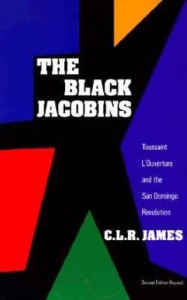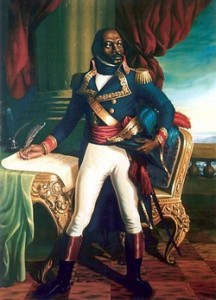 In the preface to Hegel, Haiti, and Universal History, Susan Buck-Morss credits the positive reception of her original article to the “unconventional topologies of time and space that it mapped out” (ix). The analogy with topology—a field in mathematics—is particularly insightful for this week’s readings on the Black Atlantic. Topology is concerned not only with the geometric properties of spaces, but also with how the properties of these spaces are arranged, interconnected and, thereby, transfigured. Topology concerns spaces that shift, stretch, and twist, but without breaks or tears. It is the mind-bending “topologies of time and space”—history and geography—that stand out in CLR James’ masterpiece, The Black Jacobins (the title itself almost says it all), and the supplementary readings. Crying out from these texts is a call for recognizing the dialectic of temporal-spatial topologies as a methodological and political disposition. This connectivity, James would tell us, weaves the fabric of those rare moments and places in which universal yearnings and revolutionary change becomes possible.
In the preface to Hegel, Haiti, and Universal History, Susan Buck-Morss credits the positive reception of her original article to the “unconventional topologies of time and space that it mapped out” (ix). The analogy with topology—a field in mathematics—is particularly insightful for this week’s readings on the Black Atlantic. Topology is concerned not only with the geometric properties of spaces, but also with how the properties of these spaces are arranged, interconnected and, thereby, transfigured. Topology concerns spaces that shift, stretch, and twist, but without breaks or tears. It is the mind-bending “topologies of time and space”—history and geography—that stand out in CLR James’ masterpiece, The Black Jacobins (the title itself almost says it all), and the supplementary readings. Crying out from these texts is a call for recognizing the dialectic of temporal-spatial topologies as a methodological and political disposition. This connectivity, James would tell us, weaves the fabric of those rare moments and places in which universal yearnings and revolutionary change becomes possible.
Rather than noting the obvious topologies of the French and Haitian Revolutions, I think it’s important to note—as James somewhat cryptically acknowledges in the first preface—the historical lead up and conjuncture to the book’s publication in 1938. Two years after the Russian Revolution in 1917, James’ native Trinidad was rocked by its first general strike. Shortly after, labor movements drawing on Garveyism and Communism sparked popular revolts across the West Indies, culminating in the 1930s with unprecedented political demands, including full adult franchise, self-government and nationalizations of sugar and oil industries. The year Black Jacobins was published also coincided with the founding of the Fourth International, Trotsky’s anti-Stalinist move against the Comintern. James, a committed Trotskyist, was deeply active in the movement.
This historical-political conjuncture clearly bleeds onto the pages of The Black Jacobins. James writes, “In a revolution … the meteoric flares and flights above are a meaningless chaos and lend themselves to infinite caprice and romanticism unless the observer sees them always as projections of the sub-soil from which they came” (x). For James, it was this popular “sub-soil” that steers the tectonics of revolutionary movement; the soil can be cared for, tilled, and sowed, but it should never be ignored and much less trampled. It was this sub-soil that ultimately—and fatally—receded from L’Ouverture’s political calculus. This portrait of L’Ouverture’s tragic trajectory can be read as both a jab at Stalin as well as a cautionary tale to would-be revolutionaries and revolutionary parties, whether anti-colonial, communist or both. In a talk at UCLA in 1981, James himself called the book: “the first statement of revolutionary policy and instruction for the revolutionary development of the colonial countries.” With the 1962/3 re-issue of the book in the wake of the Cuban Revolution and anticipating the independence of some Caribbean nations, James saw new topological possibilities for the political aims of his book.
 This brings me to the figure of L’Ouverture. David Scott calls L’Ouverture and his compatriots “conscripts of modernity”; they had no choice in the matter. Modernity thereafter sets the conditions—with all its silences, limits, strictures as well as openings—in which the particular thoughts and actions (or choices) of its conscripts become possible. The tragedy of colonial enlightenment is what put L’Ouverture in the impossible position of deciding between loyalty to enlightenment revolutionary France and slave freedom. A tragedy foretold: He saw both ideals as necessarily interlinked, foreclosing any option of independence. It was Dessalines, without romantic/intellectual attachments to enlightenment France, who first uttered “independence.” Interestingly, James notes Dessalines’ relative lack of academic training and summarizes this fact in the bibliographic back-matter as “the greatest lesson of the revolution” (389).
This brings me to the figure of L’Ouverture. David Scott calls L’Ouverture and his compatriots “conscripts of modernity”; they had no choice in the matter. Modernity thereafter sets the conditions—with all its silences, limits, strictures as well as openings—in which the particular thoughts and actions (or choices) of its conscripts become possible. The tragedy of colonial enlightenment is what put L’Ouverture in the impossible position of deciding between loyalty to enlightenment revolutionary France and slave freedom. A tragedy foretold: He saw both ideals as necessarily interlinked, foreclosing any option of independence. It was Dessalines, without romantic/intellectual attachments to enlightenment France, who first uttered “independence.” Interestingly, James notes Dessalines’ relative lack of academic training and summarizes this fact in the bibliographic back-matter as “the greatest lesson of the revolution” (389).
The contradictions and conundrums embodied by L’Ouverture are typical of the “double consciousness” that Paul Gilroy identifies as a characteristic of the Black Atlantic as a counter-culture of modernity. By examining the work and activities of key black intellectuals of the diaspora along with vernacular cultures, Gilroy shows how they are awkwardly positioned—and ambivalently position themselves—in ways that straddle the ins-and-outs that constitute the normative structures of modernity. Gilroy sees this as a “privileged standpoint” (111), and James would agree. Indeed, what allows Black Atlantic intellectuals like L’Ouverture to employ Enlightenment discourses in ways the Enlightenment did not—and could not—imagine was that “their critical perspectives on [the modern world] were only partly grounded in its own norms” (56). Although L’Ouverture’s politics in the end “lagged behind events,” James hails the revolutionary leader for charting an unprecedented and unthinkable political path for which no blueprints or even conceptual referents theretofore existed, a point vividly argued by Michel-Rolph Trouillot.
It’s appropriate that L’Ouverture’s name means, “opening,” because that’s exactly what the inherent double consciousness of the Black Atlantic can potentially accomplish as a counter-culture to modernity—openings built and pried from its own congenital contradictions. The Haitian Revolution—and other dissident openings—not only keep the more salvageable aspects of enlightenment universalism honest, they also expand the very parameters and particularities of what that universalism means. Right now, people in Egypt and Tunisia are living and imagining the unimaginable; in the process, they are redefining and readjusting universals for (and of) our own world-historical moment.
James, CLR. 1963 [1938]. The Black Jacobins. New York: Vintage.
Buck-Morss, Susan. 2009. Hegel, Haiti, and Universal History. Pittsburgh: University of Pittsburgh Press.
Gilroy, Paul. 1993. The Black Atlantic: Modernity and Double-Consciousness. Cambridge, MA: Harvard University Press.
Scott, David. 2004. Conscripts of Modernity: The Tragedy of Colonial Enlightenment. Durham: Duke University Press.

Pingback: Guha: Dominance Without Hegemony? | Territorial Masquerades
Pingback: Geographies of the Outlaw | Territorial Masquerades